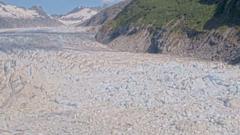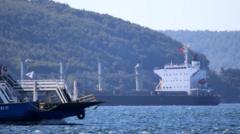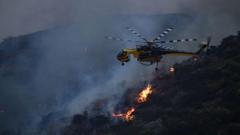As wildfires rage across Spain, the EU has dispatched two Canadair planes to help combat the blaze after the Spanish government activated the disaster assistance mechanism for the first time. Reports have confirmed that the country has seen a tragic rise in wildfire-related deaths, now totaling three as of Thursday morning. With a forecasted heatwave pushing temperatures up to 44°C, the risks for further outbreaks remain high, prompting fears across the region.
EU Steps in to Aid Spain as Wildfire Death Toll Climbs Amidst Heatwave

EU Steps in to Aid Spain as Wildfire Death Toll Climbs Amidst Heatwave
The European Union deploys firefighting aircraft to assist Spain facing severe wildfires and increasing fatalities.
Authorities in Spain's north-western Galicia have mobilized additional resources, including the two French aircraft, as government officials continue to express their concern regarding both the unfolding crisis and the ongoing weather conditions that exacerbate these fires. Interior Minister Fernando Grande-Marlaska mentioned the dire situation and hinted at the possibility of engaging more firefighting personnel if conditions worsened.
The tragic loss of volunteer firefighters in León has resonated deeply across the nation. Prime Minister Pedro Sanchez publicly extended his condolences to the families and friends of those bereaved, highlighting the gravity of the ongoing crisis. The Civil Guard recently apprehended two individuals suspected of arson related to the fires, bringing to ten the total number of arrests made since June.
Evacuations have surged, with a recent report indicating that approximately 700 residents from the province of Caceres were forced to abandon their homes. Neighboring Portugal is also grappling with wildfire outbreaks, deploying over 1,900 firefighters to contain four major blazes, notably the significant fire in Trancoso that has already consumed thousands of hectares.
The broader context of wildfires in Europe is grim, with cumulative data indicating that approximately 629,000 hectares across the continent have been affected thus far this year. Countries such as Greece, Bulgaria, Montenegro, and Albania are also enrolled in the EU's aid mechanism, requesting assistance to combat similar wildfires.
As wildfires increasingly become a summer staple in southern Europe, climate change plays a pivotal role in intensifying these events, leading to harsher, prolonged heatwaves and favorable conditions for fire spread. While it remains a challenge to attribute singular weather events directly to climate change, scientists reinforce the growing consensus that the increasing frequency and severity of heatwaves are significantly influenced by it.
As authorities strive to control the escalating situation, emphasis on regional cooperation and assistance remains paramount, reflecting the solidarity inherent in the EU’s collective response to natural disasters.
The tragic loss of volunteer firefighters in León has resonated deeply across the nation. Prime Minister Pedro Sanchez publicly extended his condolences to the families and friends of those bereaved, highlighting the gravity of the ongoing crisis. The Civil Guard recently apprehended two individuals suspected of arson related to the fires, bringing to ten the total number of arrests made since June.
Evacuations have surged, with a recent report indicating that approximately 700 residents from the province of Caceres were forced to abandon their homes. Neighboring Portugal is also grappling with wildfire outbreaks, deploying over 1,900 firefighters to contain four major blazes, notably the significant fire in Trancoso that has already consumed thousands of hectares.
The broader context of wildfires in Europe is grim, with cumulative data indicating that approximately 629,000 hectares across the continent have been affected thus far this year. Countries such as Greece, Bulgaria, Montenegro, and Albania are also enrolled in the EU's aid mechanism, requesting assistance to combat similar wildfires.
As wildfires increasingly become a summer staple in southern Europe, climate change plays a pivotal role in intensifying these events, leading to harsher, prolonged heatwaves and favorable conditions for fire spread. While it remains a challenge to attribute singular weather events directly to climate change, scientists reinforce the growing consensus that the increasing frequency and severity of heatwaves are significantly influenced by it.
As authorities strive to control the escalating situation, emphasis on regional cooperation and assistance remains paramount, reflecting the solidarity inherent in the EU’s collective response to natural disasters.




















